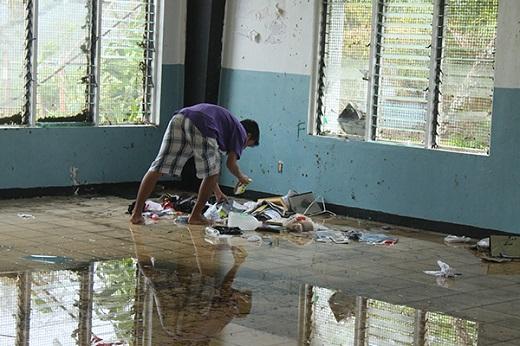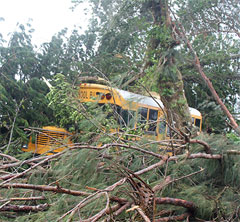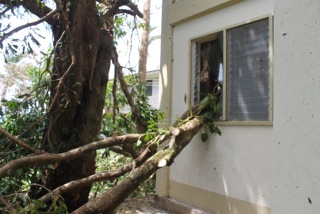
Needs assessment is ongoing for Chuuk and Yap, the two Micronesian states worst affected by Maysak. Close to 7,000 were displaced in Chuuk, with most now living with relatives or staying in schools or government offices, according to USAID. Maysak damaged crops and fishing boats, fruit trees and water catchment areas, threatening their livelihood, and affecting their food and water supply.
In Yap, the Fais Island, Faraulep Atoll, and Ulithi Atoll suffered much damage. Close to 1,500 people live in these severely affected areas. Ulithi took a direct hit and at least 60 percent of homes were damaged, according to the International Federation of Red Cross and Red Crescent Societies. USAID also reported damage to crops and water catchment systems in Fais Island and Ulithi.
Assessing affected areas has been challenging because of power outages and damaged communications systems post-Maysak. There are also locations that can only be reached by boat.

In a letter dated April 13, Asterio Takesy, Micronesia’s Ambassador to the United States and member of Xavier’s class of 1963, said the estimated cost for repairs at Xavier High School is $100,000. This does not include the cost of relief for the people of Sapuk, a number of whom are part of Xavier’s faculty and pool of host families.
In a letter dated April 11, Fr Thomas Benz SJ, Superior of the Society of Jesus in Micronesia, explained the impact of Maysak on the two communities. “It’s not so easy for our workers, our neighbours in the village of Sapuk, and our students’ sponsor families around the island. In addition to short supplies of food and water, they have no power in their damaged homes and makeshift shelters. In addition, while our generator powers the boys’ dorm and study hall, the girls (who live with sponsor families) have no light by which to do their homework.”
Xavier High School is a boarding school composed of 186 students from all over Micronesia. The school’s faculty and staff include members of the Northeast Jesuit Province, the Indonesian Jesuit Province, the Jesuit Volunteer Corps, teachers from the United States and the Philippines, as well as Chuukese professionals.
Typhoon Maysak downed trees on the campus and caused considerable wind and water damage to the school’s computer room, chapel, student centre, study hall, and several classrooms and faculty residences. Yet classes have resumed with operations running on diesel-powered generators 14 hours a day, and students and faculty working to clean up the campus.

Although part of the Northeast Jesuit Province in the United States, the Jesuit community in Micronesia participates in the Jesuit Conference of Asia Pacific, and the Japan Jesuit Province and the Philippine Jesuit Province in particular were quick to send donations and prayers.
To donate, go to xaviermicronesia.org and click the “donate now” button.






